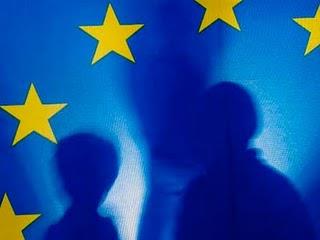by
Pew Research Center*
These are among the findings of a new survey by the Pew Research Center of more than 7,500 respondents in eight EU nations.
Support for European economic integration is down over last year in five of the eight countries surveyed. Positive views of the EU are at or near their low point in most of the countries surveyed, even among the young. The favorability of the EU has fallen from a median of 60% in 2012 to 45% in 2013. And only in Germany does at least half the public back giving more power to Brussels to deal with the current economic crisis.
The prolonged economic crisis is separating the French from the Germans – threatening the Franco-German axis that has long driven European integration. And it has separated the Germans from everyone else. The southern nations of Spain, Italy and Greece are becoming ever more estranged as evidenced by their frustration with Brussels, Berlin and the perceived unfairness of the economic system.
These negative sentiments are driven, in part, by the public’s generally glum mood about economic conditions and could well turn around if the European economy improves. And despite the vocal political debate about austerity, a clear majority in five of eight countries surveyed still think the best way to solve their country’s economic problems is to cut government spending, not spend more money.
The survey of Britain, France, Germany, Italy, Spain, Greece, Poland and the Czech Republic was conducted from March 2 to March 27, 2013. It finds:
Economic Gloom: Most Europeans are profoundly concerned about the state of their economies. Just 1% of the Greeks, 3% of the Italians, 4% of the Spanish and 9% of the French think economic conditions are good. Only the Germans (75%) are pleased. Since before the euro crisis began positive sentiment is down 61 percentage points in Spain, 54 points in Britain, 22 points in Italy and 21 points in both the Czech Republic and France. And most Europeans are almost as gloomy about whether their national economic situation will improve in the next year.
France: No European country is becoming more dispirited and disillusioned faster than France. French public opinion has soured on a number of measures in the last year: on how poorly the economy is doing (the negative rating is up 10 percentage points from 2012); on how President Francois Hollande is handling the economic crisis (24 percentage points worse than his predecessor); and on whether European economic integration has made things worse for France (up 14 points). Even more dramatically, French public opinion on a range of issues is now looking less like that in Germany and more like that in Spain, Italy and Greece.
Germany: Overall, the 2013 survey highlights more starkly than ever the differences between the views of Germans and other Europeans on a range of issues. Germans feel better than others about the economy (by 66 points over the EU median), their personal finances (by 26 points), the future (by 12 points), the EU (by 17 points), European economic integration (by 28 points) and their leadership (by 48 points).
Southern Challenge: The public mood in Spain, Italy and Greece is extremely bleak in both absolute and relative terms. More than seven-in-ten Spanish (79%) and Greeks (72%) say economic conditions are very bad. A majority of Italians (58%) say the same. This compares with a median of 28% for the rest of Europe. More than nine-in-ten in Greece (99%), Italy (97%) and Spain (94%) think the lack of employment opportunities is a very big problem. Such economic gloom has fed disgruntlement with the EU – 78% of Greeks, 75% of Italians and 60% of Spanish believe that economic integration has weakened their economy.
Economic Problems: Unemployment is the number one worry in seven of the eight countries. And a median of 78% in the eight countries surveyed say a lack of jobs is a very big problem in their country. A median of 71% cite the public debt. But in Germany half the public thinks the gap between the rich and the poor is the most important economic challenge.
Inequality: A median of 66% in the countries surveyed, including 90% of the French, think children today will be worse off financially than their parents when they grow up. A median of 77% believe that the economic system generally favors the wealthy.
Dealing with the Eurocrisis: When asked which of the economic challenges their government should address first, people in seven of the eight nations choose the lack of employment opportunities. Only the Germans say tackle inequality first. A majority in six of the eight countries surveyed considers debt a very big problem, but a median of only 17% think debt reduction should be their government’s number one economic priority. When pressed to choose between reducing public expenditures and more spending, most publics choose the former, even in Spain (67%) and Italy (59%).
Leaders: In most countries surveyed, fewer people today than a year ago think their national executive is doing a good job dealing with the euro crisis. The Germans overwhelmingly back Chancellor Angela Merkel, but have slightly more negative views of her than last year. Across Europe, Merkel remains the most popular leader by a wide margin, but majorities in Greece (88%) and Spain (57%) now say she’s done a bad job.
Some Good News: Despite rising disillusionment with the European project, the euro, the common currency for 17 of the 27 EU members, remains in public favor. And support for the euro has actually increased in Italy and Spain since last year. Moreover, notwithstanding the fact that only 26% of the British public think being a member of the EU has been good for their economy, the British remain evenly divided on leaving the EU: 46% say stay and 46% say go.
The complete survey is available at http://www.pewglobal.org/2013/05/13/the-new-sick-man-of-europe-the-european-union/ . An interactive graphic and a slideshow of key findings also are available.
*Pew Research Center is a US based nonpartisan source of data and analysis. It does not take advocacy positions. Its Global Attitudes Project conducts public opinion surveys around the world on a broad array of subjects ranging from people’s assessments of their own lives to their views about the current state of the world and important issues of the day.
The New Sick Man of Europe: the European Union
The European Union is the new sick man of Europe. The effort over the past half century to create a more united Europe is now the principal casualty of the euro crisis, and the European project now stands in disrepute across much of the continent.

Most Europeans are profoundly concerned about the state of their economies. Just 1% of the Greeks, 3% of the Italians, 4% of the Spanish and 9% of the French think economic conditions are good. Only the Germans (75%) are pleased. Since before the euro crisis began positive sentiment is down 61 percentage points in Spain, 54 points in Britain, 22 points in Italy and 21 points in both the Czech Republic and France. And most Europeans are almost as gloomy about whether their national economic situation will improve in the next year.



 By: N. Peter Kramer
By: N. Peter Kramer
